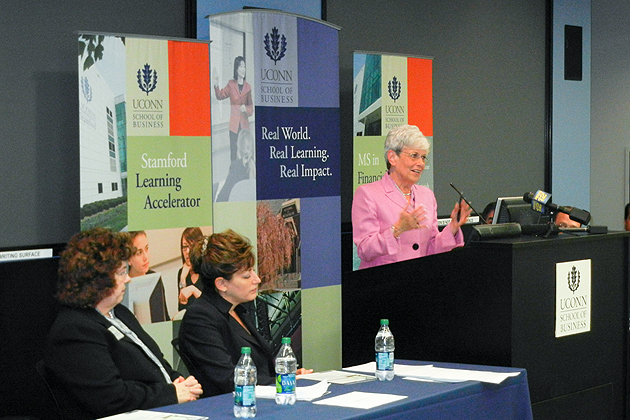
State and University officials today announced a partnership between the School of Business and seven major corporations and organizations to prepare graduate and undergraduate students for the work world while also helping the firms develop new ideas and create solutions to current challenges.
The Stamford Learning Accelerator (SLA) will bring together teams of students, faculty, and corporate partners from UBS, General Electric, IBM, K2 Advisors, and others in dedicated space at the Stamford campus that offers high tech consulting and work areas. The SLA is modeled after several other successful experiential learning accelerators in the School of Business, where teams of students, together with a faculty member, will work with a corporate representative to solve a real world issue. The program will begin with seven corporate partners.
“The SLA will provide greatly expanded University and business cooperation on experiential learning, building on the success of the school’s other learning accelerators that house projects from multiple companies and organizations,” says Karla Fox, interim dean of the School of Business. “Given its location within the economic heart of Fairfield County, the outreach and partnership efforts of the SLA will extend well beyond the seven current project sponsors, and will include many regional, national, and global businesses, as well as governmental and community programs.”
Already, SLA advisors have lined up nine projects for students, including three from GE Capital Treasury.
The business school is also bringing projects from other programs and UConn schools under the umbrella of the SLA, including:
SCOPE Learning Accelerator: The Sustainable Community Outreach and Public Engagement (SCOPE) accelerator has international and national projects, and will now be positioned at the SLA to seek similar but smaller projects from local community organizations;
The master’s program in financial risk management, now in its second year in Stamford, has increased by 50 percent the number of students studying risk management, and doubled the number of international students enrolled in the program. Students are currently involved in six team projects within the SLA, as well as its training room for Bloomberg and other financial software products. The international students are also being assisted in their transition to the United States by staff in the School of Business and other departments of the University.
The International Business Accelerator: Currently in development in the business school, the IBA is already pursuing projects and will house its future projects in the SLA. The school is also exploring opportunities for foreign student exchanges with other universities.

The SLA also will engage students beyond the business school, including students from the School of Engineering and the College of Liberal Arts and Sciences. A smart board located in the SLA will be connected to other smart boards in Storrs to facilitate communication across campuses.
Additional projects are being accepted for the spring 2012 semester – projects are generally allowed to last no more than one semester. Projects vary greatly, and this semester’s studies include:
Identification of investment risk factors for UBS. The project involves identifying various risk factors associated with making investments outside of UBS’ home country. The assessment will include risk factors associated with the specific market and associated demographics, financial investment required and anticipated return, competitive position/threats, political environment, anticipated future “landscape,” and other factors.
Financial modeling for GE Capital Treasury, a project focused on prepayments given different interest rates and economic environments.
A team from the UConn School of Business and the College of Liberal Arts and Sciences is determining the economic value of bioextraction of seaweed and the potential uses of the harvested biomass, thus contributing to the first pilot scale nutrient bioextraction research at an ecosystem level. This pilot scale nutrient bioextraction research is funded by the Long Island Sound Futures Fund of Long Island Sound Study, The Bronx River Dissolved Oxygen Fund, and the National Fish and Wildlife Foundation.
The Connecticut Center for Entrepreneurship and Innovation (CCEI) has broadened the reach of its Innovation Accelerator program by collaborating with the IP Factory, a Hartford-based non-profit organization, to develop commercialization plans for dormant or under-used intellectual property from some of Connecticut’s leading technology-based companies. Through the Innovation Accelerator, CCEI faculty-mentored student teams provide consulting services to Connecticut entrepreneurs, innovators, and institutions, most typically resulting in the formulation of a comprehensive go-to-market strategy. The Innovation Accelerator and IP Factory are joining together, with the goal of creating new companies for the marketing of these technologies, leading to the generation of new products and jobs within the state.
“We’ve been very pleased by the interest in the Stamford Learning Accelerator expressed by companies and non-profit organizations,” says Jud Saviskas, executive director of graduate and undergraduate programs for the School of Business at UConn’s Stamford campus. “Our ability to take such a wide range of projects will benefit the Stamford campus as well as many companies and the Stamford and Fairfield County communities.”



